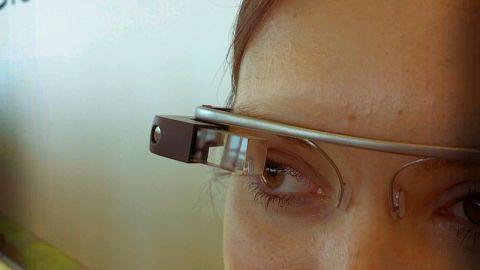No, Google Glass Won’t Create Cyborg Nation

Just a few weeks ago, it seemed like Google Glass was the new “It” technology – a technology so cool that it was suddenly socially acceptable to show up with these augmented reality glasses at fashion events and even the Oscars. But there’s been a sudden backlash to these Google Glasses as more of them pop up in the wild – bars are banning them, talk show hosts are saying they hate them and even some anonymous members of the digerati are warning that they could lead to the creation of a Cyborg nation – a corporate surveillance state patrolled by people snapping pictures and videos of you without your knowledge.
So let’s take a closer look at the major criticism of Stop the Cyborgs — that the widescale availability of the new Google Glasses (and similar technological devices) will lead to a future in which “privacy is impossible.” Google Glass, by making it possible for anyone to walk around with augmented reality screens in front of their eyes, will somehow turn every citizen into a “creepy cameraman” with the power to record, photograph or video record anyone around them. Even scarier, people might be able to find out all sorts of details about you without even knowing you or talking to you – stuff you’d rather they don’t know – like your credit score, your home address, your social security number or your relationship status. (This is basically a version of the Terminator Glasses scenario, in which we’d all be a little like the Schwarzenegger Terminator.)
But is that really the case? As Jon Evans of Tech Crunch argued recently in a piece called “Who’s Afraid of Google Glass?,” these Google Glasses may actually lead to the reverse situation – your loss of privacy may empower you in ways never before possible. The example he uses is a case in which police officers would refrain from instances of police brutality if they knew that anyone could be recording them at any time. And this example could be extended in a number of different ways – if you’re walking the streets of New York City, you wouldn’t have to worry about a random stop-and-frisk because the police officers would already know that you’re not a criminal. If you’re at the airport, you wouldn’t have to worry about a full pat-down in the security line because TSA would know that you’re not a terrorist.
The other major criticism made by Stop the Cyborgs is that the new Google Glass project will inevitably lead to an Orwellian state of “total corporate control” in which we are unable to express our individuality or escape our past. Once Google knows something about you, the rest of the world will know it too:
“There are serious consequences for human society. There will no longer be any distinction between the ‘digital world’ and the ‘real world’. People will make decisions and interact with other humans in the real world in a way which increasingly depends on information that Google Glass tells them. Gradually people will stop acting as autonomous individuals, when making decisions and interacting with others, and instead become mere sensor/effector nodes of a global network. There will be no room for multiple identities, hypocrisy or experimentation. There will be no space in which you can escape your online profile and the system will be controlled by a small group of corporations.”
This ignores the obvious, though – that we’d be able to swap out Google Glasses the way we now swap out sunglasses. Think about the way that Google is talking to the fashion industry about the new designs for Google Glass – the real future of these augmented reality glasses is all about individualism, unique style and freeing us from the confines of digital technology. You would be able to take on a new identity and experiment with new ways of viewing the world. (And then some company like Instagram would come along to give you filters for viewing that world. Maybe some days you’d want a Grunge view of the world, other days you’d want your rose-colored Glasses.) Sure, we may one day talk about Google having “control” over our lives, but only in the same way that we now talk about Apple having total control over the way we consume digital content. Nobody realistically thinks that Apple “controls” us like a bunch of Cyborgs.
Nevertheless, for anyone concerned about the future direction that technology is taking us, the Stop the Cyborgs website actually offers a balanced, nuanced take on what could happen when the digital world intrudes on our analog world. If you buy into the argument that the long-term secular trend in the technology world is the blurring of the line between man and machine and the creation of context-aware, augmented-reality experiences, then these are the types of discussions that we will need to be having sometime in the near future. Google Glass won’t create a Cyborg Nation, but it will subtly change the relationship we have with the world around us.
image: Google Glass / Wikimedia Commons




